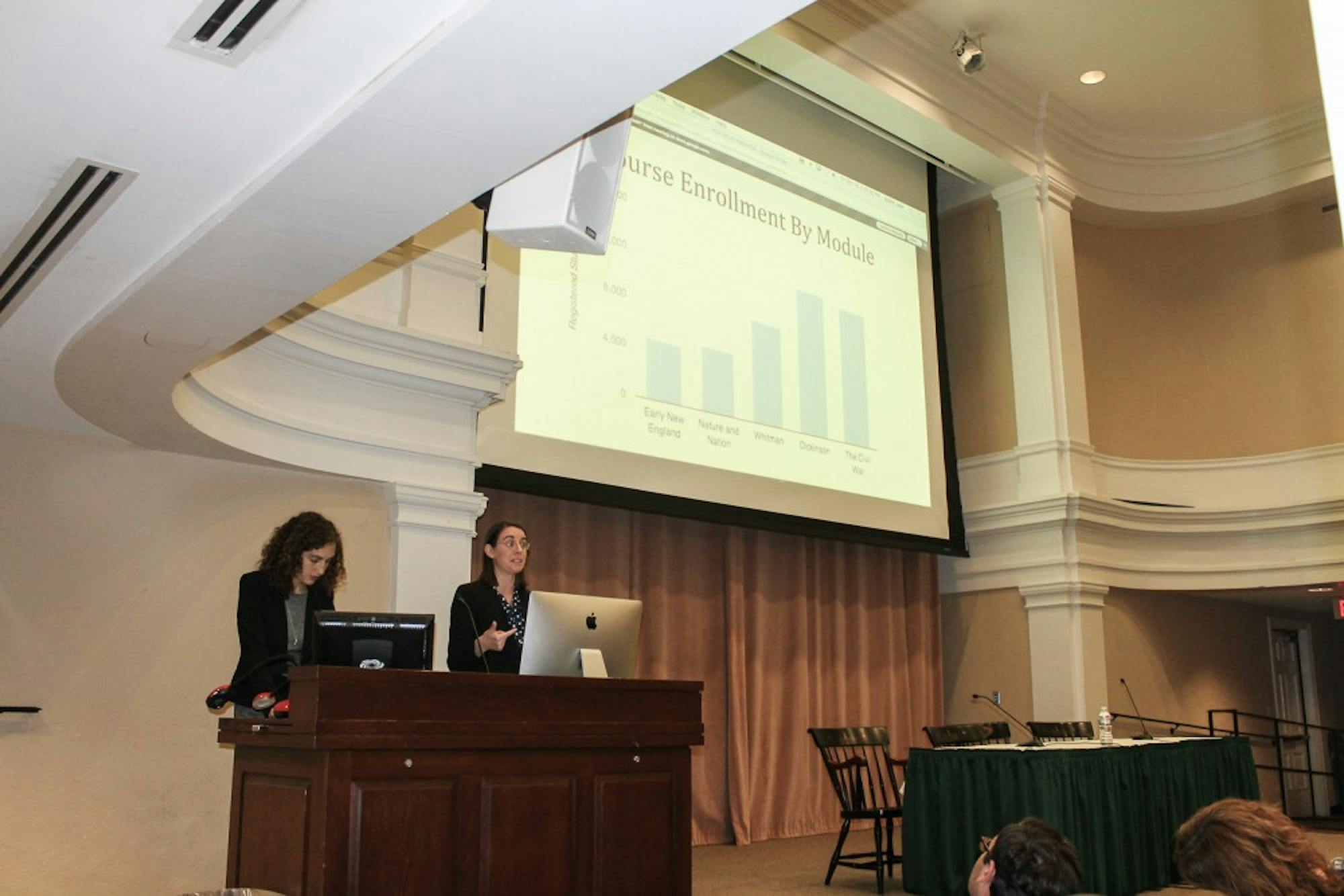Faculty from Dartmouth, Harvard University, Colgate University and the University of Pennsylvania convened at the College last Friday to share their experiences with teaching massive open online courses in the humanities and to discuss what it means to teach the humanities to a global audience.
The event, “Catalyzing Community: A Humanities Symposium on Digital Learning and Education,” came out of a deep interest in learning how to improve online learning and pedagogies in the humanities, English professor James Dobson said in his opening remarks.
The symposium featured six presentations with two question-and-answer sessions. Each speaker presented his or her own experiences with teaching MOOCs — massive open online courses — in the humanities, highlighting the approaches which did and did not work well and what they have learned from teaching an online course that they can apply to the residential classroom.
Music professor Steve Swayne and English professor Donald Pease also spoke at the event.
Swayne created Dartmouth’s third MOOC, “Introduction to Opera,” which opened last Tuesday. Pease and Dobson co-created the DartmouthX course “Literature of the American Renaissance,” which is scheduled to launch in spring 2016.
Pease and Dobson discussed how designing their MOOC has influenced their approaches to teaching and how technology affects learning. They are teaching a course at the College on the same topic this winter that will be informed in some ways by their experiences creating the online course.
English Ph.D. students and “Digital Fellows” at Harvard University Emily Silk and Adrienne Raphel spoke about the tools they used as instructors of the HarvardX MOOC “Poetry in America,” led by professor Lisa New, and noted similarities between different programs, such the use of annotation tools and discussion forums.
She said professors at all of the schools are thinking about the same issues, such as how to create productive conversations in a class of thousands of students.
Colgate University English professor Jennifer Brice spoke about the “Living Writers” course, which she has been teaching since 2010 with Colgate professor Jane Pinchin. The course ran synchronously with a residential course and used chats, blogs and question sessions to engage with the professor and students in the residential course. The MOOC also had a kick-off party in New York City where students from the online course could meet other students in person.
In many of Penn’s MOOCs, there are areas for peer review of work and reflection, Penn’s digital learning initiatives and online pedagogies director Benjamin Wiggins said. Penn’s MOOCs also stress project-based learning and experiential learning, in which students go out to the community and apply the concepts they have learned and report back, he said.
While the pedagogies used in humanities MOOCs share many similarities, the missions of each school offering them differed.
Dartmouth associate chief information officer for academic and client services Alan Cattier said that there are three main reasons Dartmouth was interested in offering online courses. First, he said that the College was interested in participating in an online experiment that could serve as “a laboratory for course development.”
A second reason Dartmouth joined edX was to participate in a consortium that was gathering data about learning and online teaching in order to benefit the College’s residential experience.
“The total collection of data could be really helpful about making data-driven decisions about how technology works and doesn’t work in enhancing learning,” he said.
Third, he said the College was interested in engaging with other institutions and sharing ideas.
Wiggins said that MOOCs provide a learning experience for Penn faculty.
“The process of teaching the MOOC gives them a new perspective on teaching. MOOCs are somewhat like a crucible. They get faculty thinking about things they’re so used to teaching,” he said.
Wiggins said components of online courses are often utilized in the classroom, where students watch lectures and models from MOOCs related to their courses before class. Wiggins said that this allows classrooms to be interactive spaces.
For Harvard, a primary goal of offering MOOCs is to extend the knowledge and appreciation for the humanities across the world, Silk said. This goal is reflected in the extent of Harvard’s online course offerings. Currently, there are 20 humanities courses on HarvardX.
Brice said Colgate’s online courses reach out to alumni and parents in order to include them in the community and prolong their learning after graduation. She also noted that the highest percentage of parents participating in the “Living Writers” course were those of freshmen enrolled in the course at Colgate.
Associate director of online learning at Princeton Laura Shaddock said Princeton also uses what it learns from designing and teaching MOOCs to enhance the classroom experience. Princeton is an edX charter member similar to the College in its size and focus on undergraduate education. PrincetonX differs from DartmouthX, however, in that the majority of their students have been in the STEM — science, technology, engineering and mathematics — fields.
“We have a number of courses in other disciplines, but the STEM courses continue to see high enrollments from students around the globe,” Shaddock said.
Additionally, Princeton does not offer paid certificates to offset the cost of developing MOOCs, Shaddock said, whereas Dartmouth does provide that option for those who are interested in receiving a formal certificate of completion. Without certification, the courses are free.
In describing what sets DartmouthX apart from programs at other institutions, Cattier said that the courses on Italian opera and American Renaissance writing were distinctive since the humanities have not been particularly well represented in MOOCs.
“There’s this entire world that opens up when you introduce a course like Italian opera and American Renaissance,” Cattier said. “They allow a particularly unique dynamic to develop, which is the signature of the humanities. The humanities are critical and are really important to Dartmouth as a liberal arts institution.”
The countries with the greatest number of participants in Dartmouth’s first two MOOCs are the United States, Canada, the United Kindgom and India, Dartmouth instructional designer for educational technologies Mike Goudzwaard said. The opera MOOC is expected to draw a more European student body, Goudzwaard said, because he thinks the Italian opera will appeal to a European audience.
The retention for Dartmouth’s first two MOOCs was around 12 to 13 percent, almost twice as much as the average retention for MOOCs, Goudzward said.
EdX director of communications Nancy Moss said that edX was pleased with the solid interest demonstrated in Dartmouth MOOCs.




